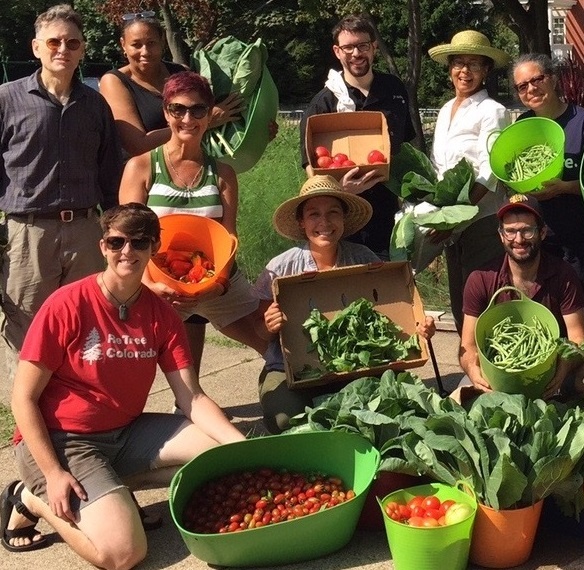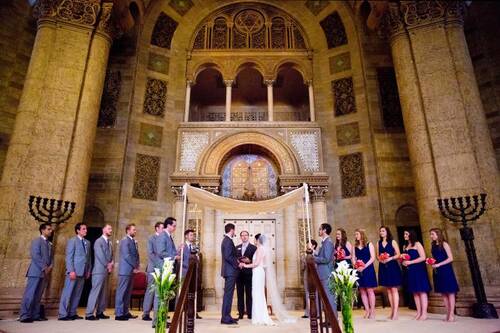Food Justice
Food Justice
Since the start of our award-winning, nationally-recognized Food Justice and Sustainability Program in 2009, we have addressed basic human needs and rights—access t o nourishing, wholesome food, clean air and water, healthy soil—through urban farming. We have transformed the synagogue's lawns and others around the neighborhood into food producing micro-farms, growing fruits and vegetables and distributing the harvests to those in need—over 30,000 pounds to date. In addition to this ongoing work, we constructed food forests in marginalized and unproductive urban areas through fruit and nut tree planting. Just as with the micro-farms, the idea is to transform unproductive spaces into productive ones. The new focus is to establish ever more sustainable and secure sources of food.
o nourishing, wholesome food, clean air and water, healthy soil—through urban farming. We have transformed the synagogue's lawns and others around the neighborhood into food producing micro-farms, growing fruits and vegetables and distributing the harvests to those in need—over 30,000 pounds to date. In addition to this ongoing work, we constructed food forests in marginalized and unproductive urban areas through fruit and nut tree planting. Just as with the micro-farms, the idea is to transform unproductive spaces into productive ones. The new focus is to establish ever more sustainable and secure sources of food.
If you're interested in volunteering with the Food Justice & Sustainability program, fill out this short interest form.
Food justice and sustainability will continue to be at the core of our efforts, but since 2015 we have been connecting that work to climate change. “Climate Change and Civil Rights” was the Food Justice and Sustainability Weekend theme that launched this focus that climate change is one of the central social justice issues of the day.

Goals
- Provide, annually, for those in need 5,000 pounds of produce through our micro-farms and food forests, White Rock Gleaning, HHDFFI, and Edible Bima Program
- Plant, with our many partners, 30-40 fruit and nut trees annually throughout Chicagoland
- Teach urban agriculture and sustainability skills and advocate for healthy, local food systems and responsible energy, land and water use through our annual mid January MLK Food Justice and Sustainability Weekend, annual mid summer Farm and Food Forest School, and new Reavis Elementary School Environmental Education Initiative
Highlights
- 2012 Hazon Vision Award for KAM Isaiah Israel’s outstanding work in creating healthier and more sustainable communities in the Jewish world and beyond.
- 2011 1st Place in the Vegetable Garden: City Wide category of the 55th Annual Mayor’s Landscape Awards program
- 2011 GOURD Award (Gifts Of Usable Research Data) from the South Side Health and Vitality Urban Health Initiative at the University of Chicago Medical Center
- 2011 Irving J. Fain Social Action Award presented by the Commission on Social Action of Reform Judaism to KAM Isaiah Israel “For its Exemplary Social Justice Program - Food Justice and Sustainability Program”
- Featured, along with four other programs, in ”Bridging the Faith Divide,” the booklet on interfaith outreach, accompanying the Dalai Lama’s 2011 Chicago visit
Farmers and Educators
Since 2009 over 500 people have been involved with the program. They have educated, advocated, planned, organized, planted, tended, harvested, and delivered over 12 tons of fresh produce. All of this work is done by an extraordinary group of individuals—members and non, interfaith, younger and older—many of whom have been participating since 2009. The program enjoys a high retention rate and a steady, annual influx of new participants.
In February they begin planning and prepping for the coming growing season, by March they are outside prepping the growing sites, by late June they begin the weekly harvest deliveries, and by the end of November they have put the growing sites to bed for the winter.
For more information and volunteer opportunities, contact Food Justice and Sustainability co-chairs Aidan Kaplan and Layla Treuhaft-Ali at foodjustice@kamii.org.
KAM Isaiah Israel Farm and Food Forest School
This dynamic, free, hands on summer program is an intergenerational learning experience open to anyone interested in learning about urban agriculture and sustainable design.
High Holy Day Fresh Food Initiative
This project provides fresh produce to our community during the "lean months," while our own urban farm is asleep for the winter.
Wed, April 30 2025
2 Iyar 5785
Plant Your Roots with Jewish Education

The roots our learners plant at KAM Isaiah Israel will lead them to be adults who live meaningful Jewish lives.
|
KAM Isaiah Israel |
Join Us For Shabbat: Fridays: 6:30 PM- Service Saturdays: 9:00 AM- Torah Study 10:15 AM- Service KAM Isaiah Israel is a 501(C)(3) EIN: 36-2192822 |
Privacy Settings | Privacy Policy | Member Terms
©2025 All rights reserved. Find out more about ShulCloud


